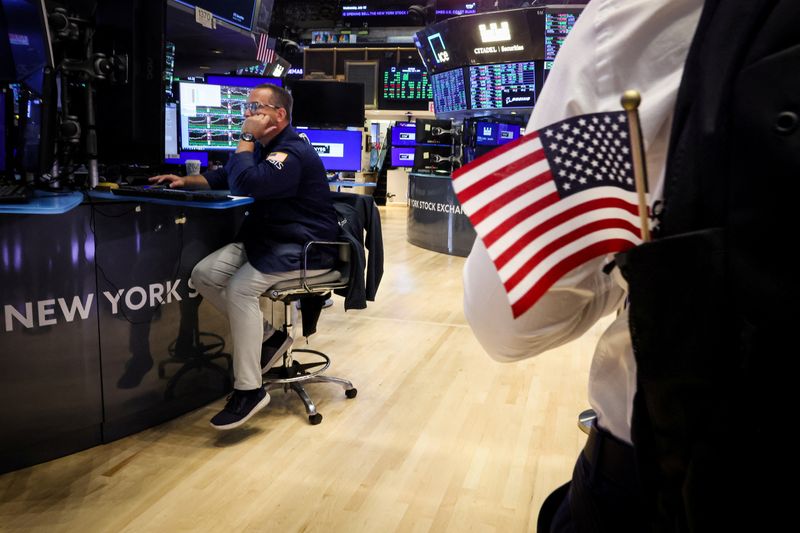By Lisa Pauline Mattackal and Ankika Biswas
(Reuters) - Wall Street was set to open higher on Tuesday as unexpectedly strong retail sales data signaled continued resilience in the U.S. economy, while doing little to dampen expectations of interest-rate cuts by the Federal Reserve this year.
Corporate earnings were also in focus. Bank of America (NYSE:BAC)'s second-quarter profit fell after its interest income shrank and it set aside more money to cover potential credit losses. However, shares of the second-largest U.S. bank rose 1.7% in premarket trading following an upbeat net interest-income forecast.
Morgan Stanley (NYSE:MS) fell 2.6% after posting wealth management revenue below estimates, while Charles Schwab (NYSE:SCHW) dropped 5% after results.
A Commerce Department report showed retail sales were unchanged in June, when they were expected to fall 0.3%, while retail sales minus automobiles jumped 0.4%, versus forecasts of a flat reading.
However, traders stuck with strong bets on a 25-basis-point rate reduction by September's central bank meeting, pricing in a nearly 88% chance, according to the CME's FedWatch.
"Investors, at first, were likely disappointed because it might not assist in helping the Fed make a decision about cutting rates. But at the same time, it's offering comfort that the U.S. economy is not headed toward recession anytime soon," said Sam Stovall, chief investment strategist, CFRA Research.
"The momentum trade will likely continue, especially with a broadening into the smaller cap companies within the U.S. investor marketplace."
Futures tracking the Russell 2000 jumped 1.2% after the small-cap index closed at its highest level since January 2022 as investors continue to move away from heavily weighted tech stocks, which have driven much of Wall Street's rally this year.
The blue-chip Dow closed at a record high in Monday's session on strong bets of a Federal Reserve interest-rate cut in September and a second term for presidential candidate Donald Trump following an assassination attempt.
Markets took it as a dovish signal when Fed Chairman Jerome Powell said on Monday that the latest economic data "add(s) somewhat to confidence" that inflation was returning to the central bank's 2% target.
Investors perceived a potential second presidential term for Trump as a positive sign for equities after he survived the shooting at his campaign rally on Saturday. However, there were signs of uncertainty, with Wall Street's "fear gauge" briefly touching its highest level in three weeks.
Trump-linked stocks retreated after Monday's rally, with Trump Media & Technology Group and software firm Phunware losing 9% and 3.8%.
At 8:44 a.m. ET, Dow e-minis were up 139 points, or 0.34%, S&P 500 e-minis were up 14.25 points, or 0.25%, and Nasdaq 100 e-minis were up 68 points, or 0.33%.

UnitedHealth Group (NYSE:UNH) rose 2.5% in choppy trading after reporting second-quarter profit above expectations, despite forecasting a bigger hit to annual profit from a cyberattack in February.
Tinder owner Match jumped 6.2% after a report activist investor Starboard has a stake of more than 6.5% in the company and was pushing for a possible sale if a turnaround wasn't successful.